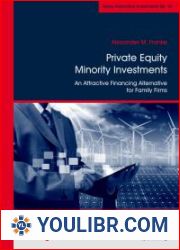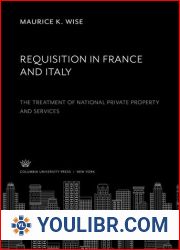
BOOKS - Private Equity Minority Investments

Private Equity Minority Investments
Author: Alexander M. Franke
Year: 2015
Format: PDF
File size: PDF 4.2 MB
Language: English
Year: 2015
Format: PDF
File size: PDF 4.2 MB
Language: English
Private equity minority investments have become an increasingly attractive financing alternative for family firms However admitting a private equity investor as a minority shareholder seems to contradict with the objective of the owner family to preserve their continuous and unlimited influence on the businesses since they must at least partially cede control over the firm to the private equity investor Therefore the purpose of this book is to identify the primary decision drivers for family firm entrepreneurs in seeking private equity financing despite the therein related partial loss of control By giving special consideration to the potential cooperation mechanisms between the shareholders this book goes beyond the scope of previous studies Cooperation is thereby considered as a prerequisite for the success of minority investments because due to its minority position the private equity investor is not able to implement its value creation strategy against the will of the family firm entrepreneur Auszug aus dem Text Textprobe Chapter 3 1 Development of the research questions The first research question is formulated as Why do family firms demand private equity minority investments This research question is elaborated in order to obtain a wide range of reasons for family firms to accept private equity minority investments The priority in the data gathering process for this part of the empirical study is to obtain a clear picture of the economic financial and managerial situation of the family firm at the starting point of the equity minority investment The thinking behind this approach is that in family firms the family literally plays a key role that results in considerable distinctions when compared with other organisational forms of business Research indicates that the strategic decisions of family firm owners are to a large extent driven by non financial aspects that can be summarised with the term socio emotional wealth Mejia et al 2007 p 106 Due to their strong identification and emotional attachment to the business owner families show a strong commitment to the preservation of family control in the firm This is the reason why the strategic decisions of family firms and the ability of the family to take risk are highly dependent on the requirements of maintaining the optimal level of socio emotional wealth Mejia et al 2007 p 134 Family firms demand for private equity financing even in form of minority investments seems to contradict with the concept of socio emotional wealth preservation because to some extent the family loses control over their business Consequently this thesis seeks to discover the reasons why family firms demand private equity minority investments despite this partial loss of control The second research question is formulated as How do non financial benefits influence the family firm s decision for private equity minority investments The reasoning behind asking this research question is mainly attributable to capital structure theories Studies on the capital structure decisions of companies have indicated that the financing decisions of companies follow a pecking order framework in which external equity is considered as the financing of last resort Myers 1984 p 576 An empirical study conducted by Tappeiner et al 2012 p 45 shows that family firms have a demand for smart money and therefore value the experience know how and network of private equity investors when providing them with voting rights With regard to the potential benefits of private equity as described in the literature review the family firms demand for non financial benefits in the fields of corporate governance professionalisation financial network M A expertise internationalisation and access to the portfolio companies network have been examined in the context of the empirical study at hand Kaplan Stromberg 2009 p 143 indicate that private equity investors have developed operational engineering methods that enable them to create value as minority shareholders i e without taking over the control over the whole company In this regard the third research question addresses the cooperation mechanisms between family firms and private equity investors What are the mechanisms that incentivise the cooperation between family firms and private equity investors in the course of private equity minority investments The consideration behind this question is to identify the mechanisms that allow private equity investors to implement their value creation strategy and apply their operational engineering methods in the family firm despite their minority position There are basically two possibilities for private equity minority shareholders to exert influence on in the family firm First the private equity investor has the possibility to compensate for the lacking control rights through the determination of special contractual privileges Second the private equity investor can work together with the family firm management on the basis of cooperation Considering the second alternative the private equity investor must align the interests of the family firm owners with their own The main goal of this research question is therefore to identify the mechanisms that incentivise cooperation between the family firm and the private equity investor Following this approach the private equity investor s influence on the advisory board the implementation of a catalogue of rights requiring approval the existence of veto rights and the design of information rights are examined Finally the sparring partner role of the private equity managers is evaluated 3 2 Methodology In the methodological part of this thesis the applied research method the development of the interview guidelines and the interview process are described 3 2 1 Research method As is outlined the nature of the present research project requires a qualitative research approach that offers various research methods e g experiments surveys archival analysis or case study The case study research method has been selected as the most promising to answer the research questions since it is particularly suitable for research on contemporary events The main advantage of the case study method is that it allows the researcher to deal with a wide range of evidence including interviews of persons who were directly involved in the events Yin 2009 p 11 This is viewed as helpful for the analysis of family firms since they are characterised by lacking transparency and the dependency of decisions on interpersonal relationships Case study analysis is the favoured research method for complex and context sensitive research topics that to date do not have much research literature available Dul Hak 2012 p 24 This is another key determinant for choosing the case study method since the research questions asked within this thesis have an explorative and context sensitive character that is reflected by their objective to examine why and how family firms engage in private equity minority investments Moreover a multi case design is implemented because it offers substantial analytic benefits compared to single case designs Yin 2009 p 61 In this context the thesis particularly benefits from the diversity of family firms analysed in terms of revenue firm age level of professionalisation and internationalisation The primary sources of information for the case studies are interviews Following the advice of Wright Kellermanns 2011 p 195 the interviews are conducted with a multiple range of respondents to increase the validity of the study Both family firm representatives and private equity investment managers are questioned about the characteristics of the respective minority investments While the family firm representatives seem to be the most promising sources for soft factors e g non financial benefits arising from private equity minority investments the private equity managers perspective is beneficiary in analysing the hard factors e g transaction structure financial covenants and veto rights Furthermore the interviews with the private equity managers are used as a control element to foster the validity of the results derived from the interviews with the family firm managers Considering the different characteristics of the case studies analysed and the broad range of interview partners semi structured interviews are selected as the appropriate research design The reasoning behind this is that semi structured interviews contain specific questions that guide the interview but still leave the researcher with the discretion to add or leave out questions if necessary to cover all important aspects Hesse Biber Leavy 2011 p 102 The interviewees are asked open ended questions to give them the possibility to express their opinion freely and to highlight the aspects that seemed to be of special importance in the specific case Following the recommendation of Wright Kellermanns 2011 p 196 additional background information on the cases is gathered from secondary sources e g annual reports press articles and the webpages of the companies and is used to prepare the interviews and verify the statements of the interviewees afterward 3 2 2 Development of interview guidelines The interviewees are provided with a short description of the research project and interview guidelines that enables them to prepare and reflect upon the questions prior to the interview The interview guidelines are developed based on the research questions posed and the expectations for the empirical part arising from the literature review Thereby the goal is to delineate the important points of the interview and to establish a framework that renders the answers of the interviewees as comparable in order to increase the validity of the present study In this context the questions posed in the interview guidelines have been complemented with additional situation related questions As both family firm representatives and private equity managers are the addressees of the empirical part of this thesis two different interview guidelines are designed These guidelines consist of four sections In the first section the family firm representative is asked general questions about their position within the firm their involvement in the transaction and their experience with private equity In the case of the private equity investors the interviewee is questioned about the investment policy of their fund the relevance of minority investment and what they perceive as the driving success factors for minority investments The answers to these questions are also used as an indicator to classify the private equity firms and establish potential relationships between the private equity investors background and the family firms expectations for the minority investment The second part of the interview guidelines is directed toward analysing the financing need of the company and the structure of the minority investment First information is gathered regarding the changes in the financing and ownership structure of the family firm after the private equity minority investment Afterward the interviewee is explicitly questioned on what the trigger for the minority investment is Following up this question the interview partner is asked to assign the financing need of the family firm to either reasons resulting from the economic situation of the company or to issues arising at the shareholder level With the next questions the selection process of the private equity investor is examined in detail Depending on the type of interviewee additional questions regarding special challenges that arise throughout the investment process or factors favouring the acceptance of a private equity minority shareholder are asked The third part of the interview guidelines is intended to highlight the structure of the minority investment especially regarding the involvement of the private equity investor in the decision making process i e influence on the advisory board rights of say information and veto rights available to the private equity investor In this context the interviewee is asked to provide information about the intended investment horizon the potential exit scenarios including buy back rights for the owner family and drag along rights for the private equity investor Furthermore questions are posed to examine the cooperation between the shareholders The last part of the interview guidelines is particularly directed toward analysing the potential non financial benefits provided by private equity Based on the implications emerging from theoretical part of this thesis the influence of private equity on governance structures the financial network and M A activity of the respective family firm is evaluated Family firm managers are also asked to evaluate the sparring partner role of the private equity managers and to indicate whether they have had negative experiences with the private equity manager Biographische Informationen Alexander M Franke born in Frankfurt am Main Germany in 1989 holds a degree in Business Administration B Sc and Finance M Sc from Frankfurt School of Finance and Management He gained first experience in the banking industry by working in the corporate finance department of a large German Landesbank Today he works in the structured finance unit of a leading international bank in Frankfurt am Main Focussing on corporate finance topics during his master studies the author was fascinated by the increasing number of family firms accepting private equity firms as minority investors His research led to the present study examining the cooperation mechanisms between family firms and private equity investors Reihe Alternative Investments Band 10
















































